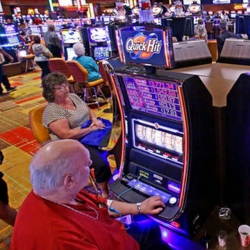
The gambling expansion is expected to generate $200 million in tax revenues every year for Pennsylvania.
Pennsylvania became the 4th US state to approve online gambling on Monday, when Gov. Tom Wolf signed a comprehensive budget bill. The signing came after 4 months of negotiations between Pennsylvania House and Senate leaders.
In July 2017, Gov. Wolf signed a $32 billion budget bill. The budget had a $2.2 billion shortfall, which the sides agreed to negotiate in the coming weeks. Those negotiations dragged on for months, to the point that many believed the budget deficit would not be solved until 2018.
Monday’s budget included provisions for online poker, online casinos, and online lottery ticket sales. The bill also contained a daily fantasy sports legalization measure. The more newsworthy clauses legalize airport terminal betting (with tablet computers) and truck stop gambling machines.
$200 Million Expanded Gambling Package
In all, the gambling provisions in Monday’s bill should generate $200 million in gambling tax revenues for Pennsylvania. The online gambling legalization is a huge story in the gaming media.
Since New Jersey legalized online casinos and poker sites in 2013, no other US state had passed an online gambling bill. California, New York, and Illinois all discussed the proposition, but now iGaming has a rich and powerful state supporting the form of gaming.
Pennsylvania is the largest state to legalize online casinos and card rooms. That adds a potential game changer for the interstate poker compact between Nevada, Delaware, and New Jersey. If Pennsylvania were to sign the interstate poker compact, it would create a potentially lucrative poker liquidity pool for online poker operators.
Online Casinos and Poker Sites
Pennsyvlania brick-and-mortar casino license holders now have the right to launch online casinos and poker sites, if they pay a licensing fee to the state. The state’s 12 operators likely will partner with online gaming software companies or traditional online gambling operators to provide gaming to Pennsylvania residents.
The Pennsylvania Lottery also gains the right to sell its products online. That include online lotto tickets sales, but also online scratchcards and keno games. States without a long history as gambling destinations, such as Georgia, legalized online lottery ticket sales over the past few years. As Sheldon Adelson’s lobbyists pushed for a federal online gambling ban, states like Georgia proved to be unexpectedly solid allies in blocking such legislation.
Truck Stop VGT Gambling
Truck stops now have the right to install up to 5 slot machine-style gambling machines called “video gaming terminals”. The truck stop VGTs would help local businesses across the state generate revenues, so the idea behind the measure is to help local business owners, while undermining the illegal gambling machine operators in the state.
The truck stop VGT clause is a compromise between the two sides, because the House of Representatives wanted to place up to 40,000 VGTs in taverns and restaurants across the state. The Senate, responding to complaints from the land-based casinos, did not want to expand slots-style gambling in the state. Limiting the enterprise to truck stops creates a more limited expansion, while the next measure — satellite casinos — represent a concession to the brick-and-mortar casinos in the state.
10 Satellite Casinos
Ten of Pennsylvania’s twelve land-based casino operations have the right to bid on a satellite casino license. A “satellite casino” is a smaller gaming operation without the amenities that large integrated casino-resorts have, or even the larger hotel-casinos in much of Pennsylvania. A satellite casino cannot be built within a 25-mile radius of other existing casinos, but are allowed to host 750 slot machines and 30 table games. Presently, large-scale casinos are limited to 5,000 slot machines per venue.
To have slot machines, a satellite casino must pay a $7.5 million licensing fee. To add the 30 gaming tables, the license holder must pay an additional $2.5 million in licensing fees. The license lasts for 7 years, but revenues go towards the next licensing fee.
In signing the bill, Governor Tom Wolf said, “There’s been a lot of pressure from a lot of places in the commonwealth to actually expand this, and we do need some recurring revenue. Again, the goal has been all along to do what’s prudent, not cannibalize existing gambling revenue coming to the state, and I think what we’re settling on will actually do that.”
Airport Terminal Betting
Eight airports, including airports in Philadelphia and Pittsburgh, will be able to offer tablet computer gambling. The 8 airports include all the international terminals in the state, as well as the Arnold Palmer Regional Airport near Pittsburgh. The tablet computers contain mobile slots games. Only visitors who have airline tickets are allowed to gamble on the gaming tablets.
In the United States, only the State of Nevada and the overseas territory of Puerto Rico allow airport gambling. In Las Vegas, slot machines are placed in the terminal, though they Las Vegas airport slots are known to have the worst house edge of any slot machine in the state.
